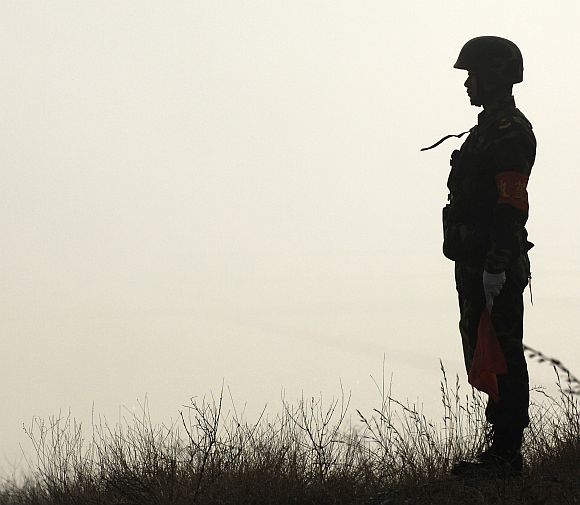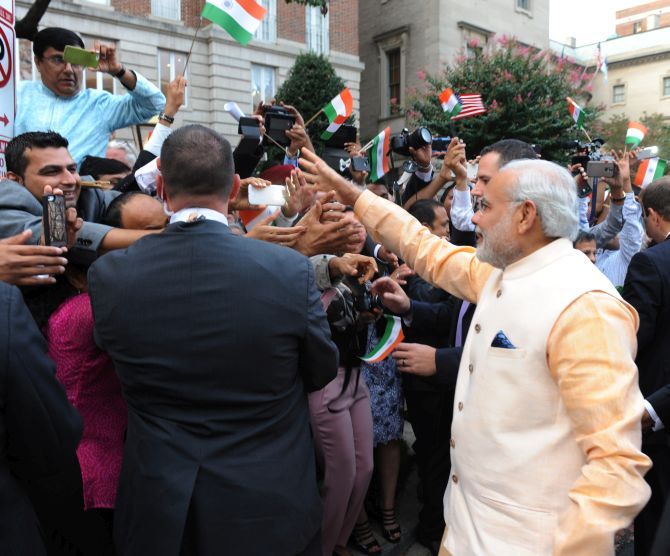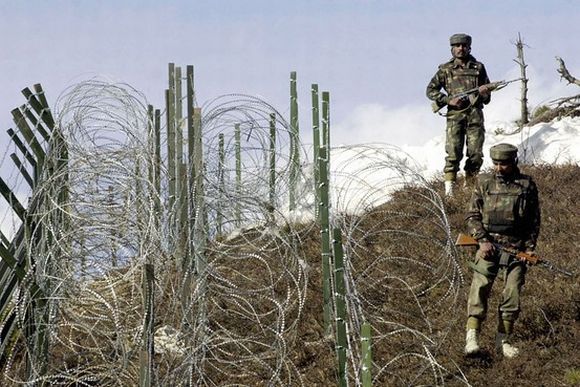
What does Shiv Shankar Menon, one of India's most brilliant diplomats and the former National Security Advisor, think of the Modi visit to the US, the Chinese stand-off in Ladakh and the situation on the LoC?
Aziz Haniffa/Rediff.com listens in.
- What India, Shiv Shankar Menon, who served as India's ambassador to Beijing in the mid-2000s, was seeking from China, "is very much what the US is seeking."
- "We don't want confrontation; we are trying to build a cooperative relationship in which both sides have stakes in producing an improving climate of relations and responsible behaviour."
- "Now can we manage the boundary dispute? We've shown over the last 30 years that it can be managed."
- "It is still a political issue with potential to actually cloud the rest of the relationship."
- "Frankly, four men, a dog and a tent are no military threat. I mean, this is political and we need to look at it in that way.

- "It (Prime Minister Modi's visit to the US) was clearly a good visit in several senses. It cleared some of the cobwebs and at least, in the minds of the public, the drift in the ties has been arrested."
- "The visit got very positive commentary in India. However, for me, it was the joint statement. If you look at the kind of work India and the US are doing together and that listing, it really shows you how far the relationship has come in the last 10 years of so and how far we have progressed and the whole range of issues in which there is congruence."
- "This is congruence built not just in terms of global issues, but also congruence built from the bottom up. This was one of the achievements of the visit."
- "The other is you have a new government in India, which clearly has plans, has ambitions, has aspirations, and it has attached itself very firmly to a much stronger relationship with the US, and that's the message that got out in India."
- "I don't think prime minister's visits are to actually produce nickel and dime outcomes. That's not the purpose. The purpose is to push the relationship forward and, I think, that was achieved."
- The one thing about the India-US relationship is that "our political cycles don't coincide and we are both democracies and we know what it means."
- "We have electoral cycles of effectiveness and administration of government and it is important that we use visits like this to actually flatten the sign curve. And with this visit, we have done that. We've done that successfully and consistently over various governments. So, for me, the last 15 years has really, steadily been an upward climb and the visit really confirmed it."
- "If ties were floundering, you wouldn't have a visit like Prime Minister Modi's. This is not something you do overnight. You don't produce a joint statement or an agenda with that kind of depth and breadth in two or three months."
- The joint statement was the result of sustained work, undertaken over a period of years.
- "What happened really was that you had this tremendous emotional peak -- this high -- when we did the civil nuclear (deal). There was no way one could sustain that. No relationship could sustain that kind of excitement and expectations were really high -- maybe too high in retrospect. But maybe it was necessary in order to do that breakthrough -- make that breakthrough."
- "It served its purpose because ultimately what you are seeing now across the rest of the relationship was made possible because of that."
- "A sad day for diplomats and journalists will be when it is a completely normal relationship and you will have nothing to write about.
- "But don't worry, there's no risk of that happening for a long time to come."

When asked about Pakistan, Menon said it was indeed a depressing situation. "It's a sad thing that every time there's a leader in Pakistan who makes it clear that he wants improved ties, there's trouble either on the Line of Control or international terrorist incidents."
"I find that it very sad, because it actually prevents the region, Pakistan, us, from really using the potential that is there."
Image: Indian soldiers along the Line of Control. Photograph: Rajesh Karkera/Rediff.com
Shiv Shankar Menon, then prime minister Dr Manmohan Singh's national security adviser, made these comments at the Brookings Institution along with the Washington, DC think-tank's President Strobe Talbott.
Recalling his years in Pakistan, Menon added that improved ties with India were a popular sentiment amongst the public, but there were strong institutional and other interests against it, which lead to this situation.
Talbott, jumped in and added, "In the case of Pakistan there is almost a structural tension between the elected political leadership and the military and the Directorate for Inter-Services Intelligence. There's a constant tug-of-war going on."
"Nawaz Sharif, of course, has lived through the perils of that relationship after the Kargil crisis, which almost led to his execution," Talbott, the former US deputy secretary of state during the Kargil conflict, recalled.

During the interaction, Modi's meeting with his Israeli counterpart Benjamin Netanyahu, left, in New York was also discussed. When Martin Indyk, a former US ambassador to Israel, asked about Modi's meeting and the silence on the Gaza war, Menon said Palestine hasn't completely vanished from the Indian radar.
However, he acknowledged, "It is clear that we have a government in India, which wants to move the relationship with Israel forward considerably."
"The party in power has traditionally looked at that relationship much more positively," Menon noted, and declared, "Today, that is a very popular relationship in India."
"Today, as a result of what we've done together, not just since we opened embassies in 1993, but actually since the foundation of the State of Israel, we've actually worked together on issues -- whether it is defence issues, or intelligence and counter-terrorism."
"I wouldn't say that people have forgotten the Palestinian issue -- that this is not an issue anymore," Menon further added. "That to me, is a bridge too far at present. I don't think silence (that Gaza didn't figure at the Modi-Netanyahu meeting) is enough."
He also said it was interesting that "there was another phase after the meeting of Prime Minister Netanyahu (and Modi), speaking at length on Iran, which gives you an idea of the complexity of the relationship, what we are dealing with here."
"The wonderful part of the relationship in my experience," Menon noted, "is that we are able to talk on all these issues openly -- lay them out on the table."
And, then he quipped to laughter from the audience that "Maybe, it is something that both countries share -- this love of talking."
Also read: 'America has got Modi's friendship'











 © 2025
© 2025